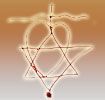channeled
on 98/08/23
checked for updates on 2005_09_22
Channeling Class Lesson Two:
Written Channeling
"In Lesson One
I mentioned
the two primary questions to be answered in this class:
How will you know what I'm saying?
And how will you know it's me who's saying it?
The second question has been answered partly in the first lesson
and partly in the exercise you've done called Meeting
the Source.
There has also been some good discussion
on this issue.
We'll now address the first question.
You'll know what I'm saying
because you'll be interpreting the communication in my energy.
"Remember, your imagination is
where the representations of my communication will appear.
You will use the faculty of intuition
to interpret these representations,
like a radio receiver interprets the signals
riding on the carrier wave of energy.
You will know how to interpret the information in my energy
because it will show up as a pattern in your imagination.
"Channeling,
like all other inner phenomena
happens in the imagination.
This is the faculty humans use to access the inner planes,
spiritual worlds, divine reality
or whatever you wish to call
what is beyond the external, material world.
In an advanced lesson of the Truth and Reality Class
Body has called it the 'second
attention'.
We use the imagination to establish contact
with each other,
and to carry out the channeling process.
You can think of the imagination
as a permeable membrane
located right at the water line
in the metaphor of the iceberg in the
introduction to this class.
Being between the conscious and unconscious parts of the mind,
it is accessed by both.
"New ideas, insights, creative inspiration and intuition
all begin in the unconscious.
As these kinds of impressions,
including the energy you will be interpreting,
rise to awareness,
they pass through the imagination.
The conscious, aware mind perceives these impressions
as representations in the imagination.
Sometimes the impressions appear visually as images or pictures,
sometimes they are heard as sounds or words,
and sometimes sensed as feelings or energy.
"Of these three main perceptive modalities,
the most reliable is sensory.
My presence is most often experienced as a felt sense,
but I am not limited to this.
My voice and words are often heard,
and of course having an image to represent me inside
is not uncommon.
It's important to remember, however,
that information in any of these systems can only represent me,
the data you perceive are not me.
The Written Method of Channeling
"We will be using a written form of channeling,
rather than vocal.
There are several good reasons for this.
First, is it much easier to get started.
The words may come slowly at first,
and with writing you can take as much time as you like.
"Secondly, tone and inflection
are a preoccupation with the spoken word,
and not so important with writing.
You will have more inner resources available
to focus on translating the energy into words when writing.
Of course, for emphasis you can use
capitalization, underline, and punctuation as appropriate.
"Third, most people are not as comfortable
speaking for another as they are writing for another.
The leap from writing for oneself
to writing for another is usually easier to make.
"Fourth, writing helps the channeling
be more clear and accurate.
Also, there is generally a greater sense of certainty
when interpreting in writing,
and of course it can be much more easily corrected
if you find you have lost the thread.
"Fifth and perhaps most important,
you will have a written record of your communication.
Even the lightest of altered states
can make it easy for information
to fall from awareness and conscious memory.
Most channeling makes even more sense
when it's read again later,
and often you will find new information
you didn't realize was there in the original experience.
"The medium you use for writing is not important,
except that you be comfortable with it.
You want to write in the way that's easiest and most convenient
at the time.
For many, typing is better than longhand.
However, if you're not a touch typist,
you may want to use pen and paper.
Whether you print or use cursive writing
depends of course on which is easier and more comfortable.
If you know shorthand, that may be the best for you.
"If typing, either the typewriter or the computer
is fine.
If pen and paper is used,
a piece of loose-leaf paper is as good as a fancy journal,
depending of course on which feels best,
and is the easiest to use in the moment.
Those who are unable to write
should of course adapt the instructions for writing
to their own needs.
If voice is absolutely the only way possible,
then it's good to use a recorder to capture the session.
Don't worry that you don't have the sound of my voice right,
no one has.
In most cases my voice will sound much like your own, and that's
fine.
[this line was missing in the old version]
Remember your role is as the interpreter of my energy,
you're not doing an impression.
"The channelers will present
an exercise from their own experiences of written channeling.
I recommend that you follow this form
when you first begin channeling,
until you are comfortable with our relationship,
and your dual roles as both yourself and my interpreter,
before you modify it to fit your own needs and style."
Written
Channeling Exercise
Lesson
Three: Channeling 'the Folks'
Channeling
Class Discussion
Channeling
Class Introduction
Channeling
Class Lesson I
|



